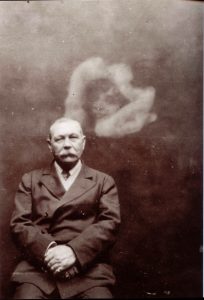
The mere existence of the heteronyms is the vexata quaestio of Pessoa studies. The critical interpretation of Pessoa’s heteronymy oscillates between an emphasis on the multiplicity or on the unity of a set of texts which a proper name, Fernando Pessoa, subscribes. The research project presupposes the unity of all of Pessoa’s written production, taken as co-incident in a single plane. Taking as mode of access the notion of “heteronym”, we intend to analyse the critical history and every problem implied in this question.
The mere existence of the so-called heteronyms is the vexata quaestio of Pessoa studies. Pessoa sought to ensure the legibility of his work both to his contemporaries and to posterity. He did so in published and unpublished texts on the genesis and identity of such quasi-actual figures, in the dramatic setting of their several colloquia, mutual admiration society, and prefaces to each other’s work, as well as in the tireless writing of as yet unpublished and stillborn publishing plans of the work of his heteronyms. And yet, the first occurrence of the word, heteronym, is late (1928, presença), being denoted until then by functionally inert terms such as “pseudonym” or by periphrastic descriptions intended to denote the putative dramatic nature of such figures.
The critical interpretation of Pessoa’s heteronymy oscillates between an emphasis on the multiplicity of the work, in which Pessoa is described as a mere rendez-vous of dramatic or mediumistic impulses endowed, by baptism, with a proper name (Alberto Caeiro et alii), or an emphasis, comparatively minor, on the unity of a set of texts which a proper name, Fernando Pessoa, subscribes. The former emphasis is attractive to those contemporary interpretations ruled by models which contest any robust philosophical notion of the “subject.” The latter, to interpreters who accept Pessoa’s own stance when, in 1932, he defended the publication of his work under his own name since it was too late, he claimed, to maintain the “thorough disguise” any longer. The dilemma of the unity or multiplicity is, as it is only to be expected, object of scrutiny for Pessoa’s best critics. João Gaspar Simões, for instance, considers Pessoa’s heteronymy to be an insubstantial and futile exercise only repaired by the orthonym Pessoa’s later encounter with the national lyrical tradition. Eduardo Lourenço describes Alexander Search as a “proto-Pessoa” wherein the topics later addressed by the major heteronyms are incipiently unified. José Gil describes this “proto-Pessoa” as the immanent plane onto which Pessoa’s sustained sensationalism is mapped. The topic of the heteronymy seems to be unavoidable in any serious critical analysis of Pessoa’s work.
The research project presupposes the unity of all of Pessoa’s written production, taken as co-incident in a single plane, irrespective of generic divisions. This strong postulate necessarily requires an additional argument which will reveal the coherence, near or remote, of all extant texts in that single plane.
Taking as mode of access the notion of “heteronym”, we intend 1) to survey and analyze all the occurrences of the latter term, or of its pre-1928 periphrastic equivalents denoting it, as well as reflections on the problem of authorship, 2) to review all the critical literature on Pessoa, which, for the most part, is heavily dependent on Pessoa’s self-interpretation, serially released in his lifetime to chosen recipients (the editors of presença, for example) or left unpublished by the author. The role and nature of Pessoa’s self-interpretative efforts, undertaken in a sustained, if erratic, manner, must be reviewed, without assuming that therein lies an unquestionable material truth (the 1935 letter to Casais Monteiro, for instance, may be read as a prime example of authorial obfuscation), 3) an exhaustive analysis of all of Pessoa’s editorial projects. The extant manuscripts include various editorial projects, expressed in jottings, notes or lists, the vast majority of which are still unpublished. They show how changing were the titles attributed to given texts, as well as the inclusion of any given text in a larger work or its subsumption under the name of any of the heteronyms. The collection and analysis of these materials are decisive, when we realize that the attribution of a given text to a name cannot be separated from an editorial thought, and how the attribution of an idea of whole to the work, permanently changed and never definitively fixed, is implied in this thought.
The results of these analyses, undertaken by a team of, mainly, junior researchers, under the supervision of a team of established senior researchers in the field, will be published in a series of volumes, and debated in a permanent seminar and in public conferences open to anyone who wishes to join the ongoing debate.



